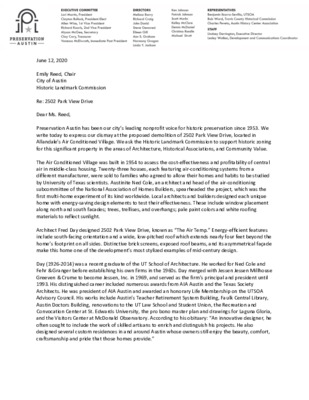D.13.v - 2502 Park View Dr - Preservation Austin letter — original pdf
Backup

June 12, 2020 Emily Reed, Chair City of Austin Historic Landmark Commission Re: 2502 Park View Drive Dear Ms. Reed, Preservation Austin has been our city’s leading nonprofit voice for historic preservation since 1953. We write today to express our dismay at the proposed demolition of 2502 Park View Drive, located in Allandale’s Air Conditioned Village. We ask the Historic Landmark Commission to support historic zoning for this significant property in the areas of Architecture, Historical Associations, and Community Value. The Air Conditioned Village was built in 1954 to assess the cost-effectiveness and profitability of central air in middle-class housing. Twenty-three houses, each featuring air-conditioning systems from a different manufacturer, were sold to families who agreed to allow their homes and habits to be studied by University of Texas scientists. Austinite Ned Cole, an architect and head of the air-conditioning subcommittee of the National Association of Homes Builders, spearheaded the project, which was the first multi-home experiment of its kind worldwide. Local architects and builders designed each unique home with energy-saving design elements to test their effectiveness. These include window placement along north and south facades; trees, trellises, and overhangs; pale paint colors and white roofing materials to reflect sunlight. Architect Fred Day designed 2502 Park View Drive, known as “The Air Temp.” Energy-efficient features include south-facing orientation and a wide, low-pitched roof which extends nearly four feet beyond the home’s footprint on all sides. Distinctive brick screens, exposed roof beams, and its asymmetrical façade make this home one of the development’s most stylized examples of mid-century design. Day (1926-2014) was a recent graduate of the UT School of Architecture. He worked for Ned Cole and Fehr & Granger before establishing his own firms in the 1960s. Day merged with Jessen Jessen Millhouse Greeven & Crume to become Jessen, Inc. in 1969, and served as the firm’s principal and president until 1993. His distinguished career included numerous awards from AIA Austin and the Texas Society Architects. He was president of AIA Austin and awarded an honorary Life Membership on the UTSOA Advisory Council. His works include Austin’s Teacher Retirement System Building, Faulk Central Library, Austin Doctors Building, renovations to the UT Law School and Student Union, the Recreation and Convocation Center at St. Edwards University, the pro bono master plan and drawings for Laguna Gloria, and the Visitors Center at McDonald Observatory. According to his obituary: “An innovative designer, he often sought to include the work of skilled artisans to enrich and distinguish his projects. He also designed several custom residences in and around Austin whose owners still enjoy the beauty, comfort, craftsmanship and pride that those homes provide.” 2502 Park View Drive retains integrity as defined by the National Register of Historic Places and clearly conveys its historical significance. Preservation Austin believes the property meets the following criteria for historic zoning under Austin’s land development code: Architecture: - The house embodies the distinguishing characteristics of midcentury residential design. Its passive cooling strategies, now common practice today, are hallmarks of the era’s emphasis on site-specific design in response to local environments. This is a particularly fine example of a modest, but stylized, midcentury home for the middle class. The house exemplifies technological innovation in design and construction, with cutting-edge climate-control techniques shaped by the larger Air Conditioned Village experiment. This is an outstanding early work of Fred Day, an architect who significantly contributed to the development of the city. His involvement in this high-profile, and much-celebrated, project was an early victory in his 40-year career. - - Historical Associations: - - The Air Conditioned Village was an internationally-renowned experiment in building innovation and social science. Its success impacted the architecture and economics of air-conditioning for homebuilders and their middle-class audience. It demonstrated the psychological impacts of design and environment as well, with scientists studying inhabitants’ health and behavior – including moods, preference for hot or cold meals, hours of sleep per night, allergies and respiratory issues. Air-conditioning in everyday homes transformed the way Americans lived and interacted during the postwar era, and 2502 Park View Drive embodies these historical associations. Community Value: - The Air Conditioned Village is embedded in Austin’s identity. Native son, and midcentury innovator, Ned Cole convinced organizers to locate the project here because of Austin’s hot temperatures, booming Sun Belt economy, and proximity to the University of Texas, a prominent research institution. This beloved historic resource is part of Allandale’s cultural fabric and an irreplaceable hallmark of Austin’s significant postwar heritage. The Air Conditioned Village has seen too many demolitions, at a rapidly increased rate, over the past several years. Today only fifteen of the original twenty-three homes retain integrity, though a draft National Register nomination is underway with the support of advocates, neighbors, and our colleagues at Mid Tex Mod. Every loss brings us closer to losing any chance for a historic district to honor and protect these buildings. We urge the Historic Landmark Commission to consider taking action on this issue, and offer our support to help protect this irreplaceable piece of Austin’s history. Thank you for your service to our community. Lori Martin President